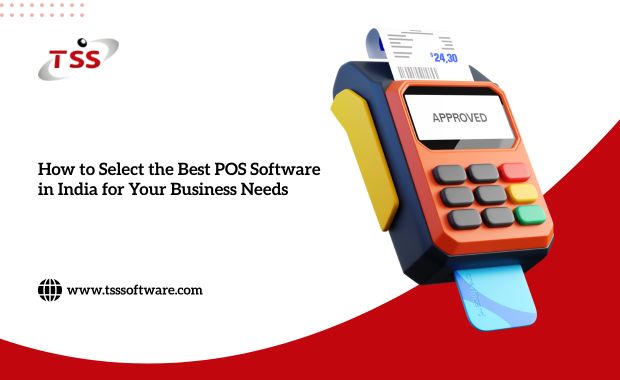We are a leading ERP software product development company in Mumbai, specializing in intelligent, cloud-based ERP solutions.
We are a leading ERP software product development company in Mumbai, specializing in intelligent, cloud-based ERP solutions.

In today’s fast-paced digital marketplace, every business—whether retail, restaurant, salon, pharmacy, or supermarket—needs a reliable Point of Sale (POS) system to streamline operations and enhance customer experience. India’s POS software market has grown rapidly in the last few years, driven by digital payments, GST compliance needs, and increasing demand for automation. But with so many POS solutions available, selecting the best one for your business can feel overwhelming.
This guide simplifies the process and helps you understand the key features, factors, and considerations that should influence your decision. Whether you're upgrading from a traditional billing machine or choosing POS software for the first time, this guide will ensure you make a smart, future-ready investment.
Before evaluating POS software, be clear about your business needs. Different industries require different tools. For example:
Knowing your requirements helps you shortlist POS systems designed specifically for your industry.
2. Choose Cloud-Based POS Over Traditional Systems
In India, cloud-based POS systems have become the preferred choice because they offer flexibility, real-time access, and better security.
Benefits of Cloud POS:
Access Anywhere: Monitor sales and stock from any device.
Automatic Updates: No manual installations or downtime.
Data Security: Encrypted cloud backups protect your information.
Scalability: Easy to add new outlets, users, or features.
Cost-Effective: No heavy hardware setup; works with a computer, tablet, or mobile.
Cloud POS ensures your business runs smoothly even if your local system crashes or you are away from the store.
3. Check for GST-Compliant Billing
Since GST billing is mandatory in India, your POS software must support:
A GST-ready POS simplifies accounting, saves time, and reduces compliance errors.
4. Look for Robust Inventory Management
Inventory management is the heart of any POS software. A good POS should allow you to:
This ensures you never run out of high-demand products and avoid overstocking slow-moving items.
5. Ease of Use and Fast Billing Interface
The POS interface should be clean, simple, and fast to operate. Complex systems slow down billing, hurt customer experience, and require more staff training.
Check for:
Support for barcode scanners, card swipers, printers, etc.
User-friendly POS software ensures smoother operations even during rush hours.
6. Payment Integration and UPI Compatibility
India’s digital payment ecosystem is rapidly evolving, and your POS must support multiple payment modes such as
Seamless payment integration minimizes errors, reduces reconciliation time, and enhances the customer experience.
7. Multi-Store and Multi-Device Support
If you have multiple outlets or plan to expand, choose POS software that offers:
Your POS should support unlimited devices (PC, tablet, mobile) and easily add new users and roles.
8. CRM and Loyalty Programs
Customer retention is more cost-effective than new acquisition. A POS with built-in CRM features helps build loyalty and drive repeat sales.
Smart CRM tools in POS software help you understand customer behavior and boost sales.
9. Reports and Analytics for Better Decision Making
A strong POS system offers detailed reports that help you track performance and make data-driven decisions.
Analytics give you a clear picture of what’s working and what needs improvement.
10. Hardware Compatibility
Your POS software should be compatible with essential hardware such as
Choose flexible software that supports both traditional POS hardware and mobile/tablet setups.
11. Customer Support and Training
When choosing POS software in India, support quality is crucial. Look for:
24/7 customer support
Multi-language support (English, Hindi, regional languages)
Strong support ensures minimal downtime and continuous productivity.
12. Pricing and Subscription Plans
POS software pricing varies widely in India. Evaluate cost based on:
Hardware requirements
Avoid software with hidden charges. Choose a provider offering transparent pricing and a free trial.
13. Check Reviews and Reputation
Before finalizing your POS software, check:
User reviews on Google and software marketplaces
Case studies
Testimonials from businesses similar to yours
Social media feedback
A reliable POS system should have positive reviews, consistent updates, and strong customer retention.
Final Thoughts
Selecting the best POS software in India depends on understanding your business needs, comparing key features, and choosing a system that offers value, scalability, and ease of use. A POS should not only handle billing but also help you manage your entire business—from inventory and customers to payments and sales analytics.
Investing in the right POS system empowers your business with speed, accuracy, and efficiency. As India continues to move toward digital-first operations, choosing a future-ready POS ensures smooth operations, satisfied customers, and long-term growth.
If you’re looking for the best POS software in India, start with your requirements, explore top providers, and take advantage of free trials to test what works best for your business.


Have a project in mind or just exploring your options? Connect with our expert team today.